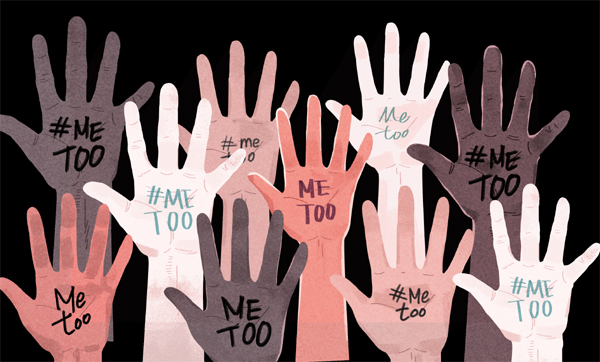
PARMITA DAS – NOVEMBER 22, 2018
Sexual Harassment Through the Lens of Economics
Sexual harassment unfolds within the architecture of systemic abuse in which aspirations and dignity are regularly violated. According to a 2016 Equal Employment Opportunity Commission (EEOC) report, up to 85% of women reported being harassed at work. Research by sociologists show that women who experience harassment are 6.5 times more likely to leave their jobs. The psychological toll of harassment is akin to being exposed to excessive health hazards or suffering a serious injury. Sexual harassment derails career trajectories and women experience more adverse effects from interruptions to their career paths. Imbalances in financial security make it harder for women to stand up for their rights in the workplace. They often opt for less lucrative careers where sexual harassment is less likely to occur.
Sexual harassment is a product of unchecked corporate power and a labor landscape where workers face heightened job insecurity and are afforded few protections. Firms suffer loss of productivity, higher turnover and loss of reputation as a result of sexual harassment, in addition to lawsuits and legal settlements. In the status quo, companies make use of non-disclosure agreements, forced arbitration agreements, and confidentiality provisions as tactics to maintain secrecy regarding the predators under their employ. A 1988 study found that sexual harassment costs a typical Fortune 500 company $6.7 million a year, equivalent to $14 million in 2017 dollars. The cost to the federal government was found to be $327 million, according to a 1994 study.
Workers across the socioeconomic spectrum are sexually abused in exchange for the privilege of earning a living. This problem permeates all industries but is particularly incident on blue collar workers who fear blacklisting if they report misconduct. It is aggravated in the status quo because of the lack of clear pathways for addressing abuse in the gig economy. Sexual harassment cases are hard to win because of the subjectivity of what constitutes a “hostile work environment” and victims are afraid to come forward as they anticipate intimidation and defamation lawsuits. The average wait time for a complaint addressed to the EEOC was 295 days in 2017 and the current political climate is likely to aggravate these existing systematic problems as the EEOC’s budget is expected to decrease.
According to the power threat theory, harassers are driven less by sexual desire than by an urge to control and dominate women who are viewed as threats to male privilege and undeserving of their positions. This is evidenced by the fact that women who hold power in male-dominated workplaces experience increased rates of sexual harassment. Men benefitting from privileged opportunities feel more fragile and subordinate women who threaten those opportunities by treating them as sex objects rather than equal competitors.
Economic Ramifications of the #MeToo Movement
The #MeToo movement raised awareness of the problem of sexual harassment of women at the workplace and, following the movement, there has been a growing pressure on firms to change how women are treated at work. The number of shareholder class action lawsuits based on gender claims has risen, citing problems like an established “bro culture”, obstruction of harassment complaints, and gender-based discrimination. Demand for data regarding the protection firms provide women has increased, deriving a demand for the services of companies such as Equileap that rank companies according to what they do for women.
Firms are issuing a growing number of public declarations of zero tolerance, adopting inclusive growth initiatives, and improving internal procedures for reporting harassment. They are susceptible to public outrage if they are found to be keeping sexual predators on their payroll and face a steep loss. The costs are likely to grow as the #MeToo movement grows and the laws governing non-disclosure agreements and the statute of limitations become laxer to assist with reporting abuse. Firms that tolerate harassment lose out on female talent to rivals that do not and the market punishes them for it. Conversely, the rewards to shareholders for a firm legislating affirmative action policies are significant.
The #MeToo movement has spurred the creation of a $21 million legal defense fund by Time’s Up, a movement against sexual harassment founded by Hollywood celebrities, to finance the legal costs of victims of workplace sexual harassment. It prompted Washington to bar employers from pursuing mandatory non-disclosure agreements for employees, which stops them from speaking out publicly about their experiences for fear of legal repercussions. #MeToo bills are being proposed, including those that ban the use of forced arbitration clauses in contracts and, thereby, waive employee’s rights to take their employer to court over disputes. Furthermore, the movement and revelations of child abuse in Catholic churches in America have driven discourse about extending or ending the statute of limitations for sexual assault cases.
However, according to the Equal Employment Opportunity Commission, there has been a mere 3% increase in sexual harassment complaints filed by employees themselves this year. Additionally, there has only been a modest uptick in workers’ class action lawsuits as the Supreme Court upheld employers’ rights to block employees from filing them. Most accused face the court of public opinion rather than the law itself.
Some people fret about the backlash that women will face at work as a result of the movement. Senior male executives may no longer feel safe to mentor aspiring females or wine and dine with them alone, following a code of conduct referred to as “the Pence rule.” However, such obstacles are to be expected in the process of changing established norms on the position of women in the workplace.
Economics of Consent
In the presence of a power dynamic, consent is complicated to discern. When one party is the gatekeeper for the other’s career and livelihood, consent cannot be conclusively rendered without coercion. Consent is a function of power – meaning you have to have a modicum of power to give it. It is jeopardized when a person’s livelihood is at risk. The victim may fear economic exile and lack the financial autonomy to make an informed decision. The role of economic inequality in reinforcing rape culture is therefore noteworthy.
The effect of the power dynamic is reinforced by the media, where accusers of high-profile individuals are branded in society. Whistleblowers are penalized with career stagnation and marginalization.
This is a serious problem in academia where supervisors wield power over the job prospects of graduate students, leaving them vulnerable to be exploited. In fact, according to a study published in the Utah Law Review in 2018, 1 out of 10 female grad students at major research universities had been sexually harassed by a male faculty member.
Female workers face barriers to reporting abuse because the predominantly white male leadership of unions put an emphasis on protecting male workers alleged to be harassers. Oftentimes, the union representatives themselves are harassers and afford no protections to the victims.
Sexual abuse systematically pervades the global supply chain, which profits off of defenseless women. In such contexts, men exercise their dominance and protect themselves from the consequences of their actions by leveraging their power. Groups at the intersection of gender inequalities with other inequalities are particularly vulnerable to power imbalances. Structural inequalities produce sexist ideas and allow them to flourish.
As women bear the brunt of the gender wage gap, have fewer job advancement opportunities, and play a disproportionate role in caring for children and elderly parents, they often silently endure abuse in instances where they lack a secure economic future. They fear the very real consequences of rejecting sexual advances. Therefore, women need long term financial security to be better protected from sexual predators. Stronger equal pay protections, compensation payments, and better access to career advancement is necessary to rectify the social wrongs that leave women vulnerable. Women need to make use of their collective strength to correct systematic inequalities and sexist views. Affording women more legal protections in the workplace would increase the likelihood that they would start their own businesses, which would contribute to economic growth.
Ways Out
Researchers suggest that obtaining a gender balance in the office is crucial to combating sexual harassment, so firms should be encouraged to hire and promote more women. According to Belle Rose Ragins, a professor at the Lubar School of Business, “Mentoring relationships are the chisels which help women break the glass ceiling.” Incentives should be put into place to encourage employers to extend such opportunities to women. By leveling the playing field between men and women at work, 28 trillion dollars would be added to the global GDP by 2025.
The next step would be to improve reporting systems to put the burden on abusers rather than the victims and address the systemic barriers that disincentivize victims from reporting. Legal inequalities impede women’s access to capital and entrepreneurship. Updating the legal protections afforded to vulnerable groups is paramount to increasing the accountability for sexual harassment across class dimensions. Accountability of boards to the marketplace can be increased by disclosing settlements made in sexual harassment cases to the public. Additionally, according to the severity of infractions, women should be offered services to help them recover from the long-term effects of sexual harassment.
Conclusion
Women make up half the world’s working age population but do not have the capital, agency, and opportunities they need to achieve their full economic potential. As a result, the global economy suffers. It is necessary to illuminate the economic dimensions of the social problem of sexual harassment that was mostly under the radar till recently. Funding needs to be directed towards social scientists studying the scope of the problem and its costs to society. The #MeToo movement pushed the needle forward but the momentum needs to continue to build.
Featured Image Source: GirlTalkHQ
Disclaimer: The views published in this journal are those of the individual authors or speakers and do not necessarily reflect the position or policy of Berkeley Economic Review staff, the UC Berkeley Economics Department and faculty, or the University of California, Berkeley in general.



